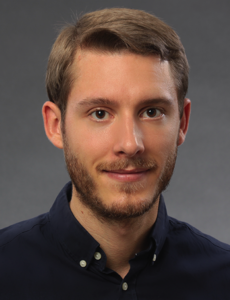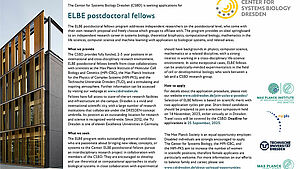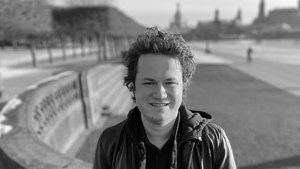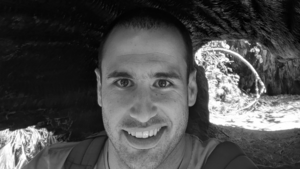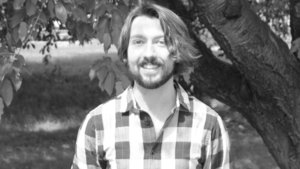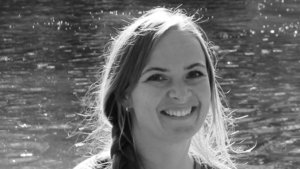
Highlights
Institute's News
New Max Planck Fellow group established at the institute
The Max Planck Fellows Programme promotes cooperation between universities and Max Planck institutes and enables a university professor to install a research group at an MPI. We are glad to announce that Prof. Jan Budich from TU Dresden has started a new Max Planck Fellow group "Dissipative Quantum Matter" at MPI-PKS. The research group will explore quantum many-body systems in which dissipation plays a crucial role, for example inducing novel phases of topological matter or enabling the controlled preparation of complex quantum states in the context of quantum simulators. Regarding physical platforms, the spectrum of interest ranges from quantum condensed matter to atomic and quantum-optical many-body systems.
Welcome at the institute, Jan!
Read moreInstitute's News
Call for Distinguished PKS Postdoctoral Fellowship 2024 open!
Application deadline: 10 November 2023. Distinguished PKS postdoctoral fellows appear personally along with the departments and groups on the main research page of the institute and are expected to have at least one year of postdoctoral experience at an institution other than the one at which their PhD was awarded. Applications for this fellowship directly after completion of the PhD might be considered in exceptional cases.
Please click on the link- button to see the full advertisement!
Read moreInstitute's News
ELBE Postdoctoral Fellowships call is open!
Application deadline: 25 September 2023. The ELBE postdoctoral fellows program addresses independent researchers on the postdoctoral level, who come with their own research proposal and freely choose which groups to affiliate with. The program provides an ideal springboard to an independent research career in systems biology, theoretical biophysics, computational biology, mathematics in the life sciences, computer science and machine learning with application to biological systems, and related areas. Please click on the link- button for more info and application instructions!
Read moreInstitute's News
New Research Group: Superconductivity and Magnetic Correlations
We cordially welcome the arrival of our new group at the institute, headed by Alexander Wietek, who joins us from the Flatiron Institute. Alex's group is interested in the way quantum particles, like electrons or atoms, organize themselves while interacting with one another. This way, Alex and his colleagues aim at understanding how the macroscopic behavior of materials, like various forms of magnetism or superconductivity, emerges. Besides trying to explain existing experimental phenomena in solid-state physics, they investigate under which circumstances entirely new states of matter, like quantum spin liquids, can occur.
To solve these questions, the new group is developing numerical technology to simulate quantum many-body systems. The quantum many-body problem is considered to be exponentially hard in the number of particles. One approach Alex is pursuing is to push the limits of exact simulations by developing high-performance computing software and distributed parallel algorithms for quantum many-body systems. Furthermore, the team is also embracing tensor network methods to reduce computational complexity by representing data efficiently.
Welcome at MPI-PKS!!
Read moreInstitute's News
Call for Distinguished PKS Postdoctoral Fellowship 2023 now open!
Application deadline: 17 November 2022. Distinguished PKS postdoctoral fellows appear personally along with the departments and groups on the main research page of the institute and are expected to have at least one year of postdoctoral experience at an institution other than the one at which their PhD was awarded. Applications for this fellowship directly after completion of the PhD might be considered in exceptional cases.
Please click on the link- button to see the full advertisement!
Read moreInstitute's News
New Research Group: Nonequilibrium Quantum Dynamics
The research in our new group "Nonequlibrium Quantum Dynamics" lies at the intersection of many-body dynamics, quantum simulation, quantum control, and applications of machine learning in physics. It is headed by Marin Bukov, who joins MPI-PKS from the University of Sofia. Marin and his coworkers are interested in problems of both fundamental nature and immediate applications. They develop approximate analytical methods, and design numerical techniques in order to investigate different problems in quantum dynamics, and collaborate with theory groups and experimental labs to test the theoretical predictions against experiment.
Welcome to the institute, Marin!
Read moreInstitute's News
New Research Group: Dynamics of quantum information
A warm welcome to Pieter Claeys! Coming to our institute from the University of Cambridge, Pieter establishes the research group "Dynamics of quantum information". The group’s research lies at the interface of condensed matter physics and quantum information, using a variety of theoretical and numerical approaches to study the dynamics of quantum many-body systems. Research topics include the dynamics of entanglement, quantum chaos and thermalization, unitary circuit models, and general aspects of non-equilibrium quantum dynamics. The group will also focus on bridging recent advances in the dynamics of quantum systems and quantum computation.
Read moreInstitute's News
New Research Group: Transport and flows in complex environments
We cordially welcome Christina Kurzthaler at the institute! Christina joins MPI-PKS from Princeton University and establishes the research group "Transport and flows in complex environments“. The group aims to unravel physical phenomena arising in soft and active matter, with emphasis on the role of transport and flows for biological systems and microfluidics. Its research topics range from the hydrodynamics of swimming bacteria and their interactions with their environments to the statistical physics of active transport in porous materials to the motion of colloidal suspensions in microfluidic settings. While the group's work is theoretical, it seeks to establish collaborations with experimentalists of the Dresden research community.
Read moreInstitute's News
Emergency Fellowships for Scientists in Ukraine
We offer Emergency Fellowships to researchers at all career stages in Ukraine. Applications are considered continuously.
Read moreInstitute's News
Call for ELBE postdoctoral Fellowships now open!
Application deadline: 13 March 2022. The ELBE postdoctoral fellows program addresses independent researchers on the postdoctoral level, who come with their own research proposal and freely choose which groups to affiliate with. The program provides an ideal springboard to an independent research career in systems biology, theoretical biophysics, computational biology, and related areas. Please click on the link- button to see the full advertisement!
Read more
